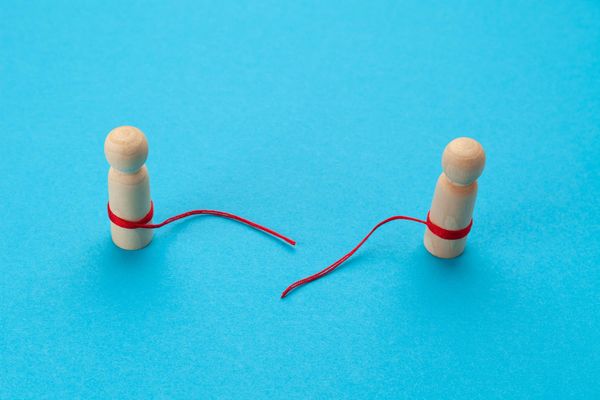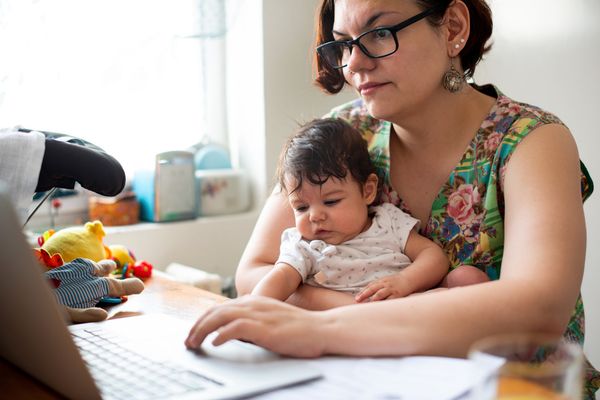This article has been archived. We will no longer be updating it. For our most up-to-date information, please visit our parenting information here.
Ashley Abeles is a #teamHealthyWomen Contributor and this post is part of HealthyWomen's Real Women, Real Stories series.
It's hard to be a perfectionist, isn't it? To always hold yourself to a painfully high standard? To worry if you've done everything just right? To be afraid of letting yourself or anyone else down? That can be exhausting. But if you're anything like me, it's also your normal. It's your default setting.
And it often works for us. We hang the bar high, and we are typically able to reach it. Perfectionists are generally goal-oriented, driven, and hardworking––a winning combination when it comes to success. But what about the times when we've set an unrealistic expectation and inevitably fall short? Well, that just feels awful. I don't know about you, but I mostly handle this by emotionally beating the heck out of myself, then stumbling on to the next battle with my bruised confidence.
I carried this heavy bag of perfectionism with me into parenthood. I felt an overwhelming need to be the perfect mother––whatever that meant. I planned to breastfeed for an entire year (or more!), to only purchase wooden toys, to have my son sleeping through the night almost immediately, to flawlessly support his physical, emotional, and cognitive growth, and, of course, to have him eating only a healthy, organic, and homemade diet––to name just a few of the expectations I set for myself. Oh, and I was supposed to love every single minute of it—let's not forget about that one.
On top of this, I felt self-imposed pressure because of my professional work. I am an early childhood educator and thought that my experience required me to be mother-of-the-year. I also believed that, because motherhood is a natural thing, this would all come easily to me. Spoiler alert: it didn't.
When my beautiful son arrived, all of my expectations went to you-know-what. Parenthood was so much harder than I could have imagined. I felt completely out of control, which was painful for a perfectionist like me. I was at the mercy of this tiny human, and it seemed that no amount of desire, drive, or effort could help me achieve all of my mom-ing goals. Our son had medical concerns early on, and we had some difficult family circumstances at the time, making these goals feel even further out of reach.
I realize now that my goals would have been out of reach anyway. They were simply unrealistic. Who can do everything flawlessly? No one––that's who. Feigning perfection on social media does not count!
In real life, none of us are perfect. I certainly could not come close to perfection in the condition I was in. I had a frightening and challenging birth experience. I was recovering from major abdominal surgery. I was anemic and could barely move without becoming light-headed. My thyroid levels were entirely out of whack, and I was excruciatingly sleep-deprived (I'm talking 1-2 hours of sleep per day). That doesn't even cover all of it.
Under what other circumstances would we expect someone in this condition to do anything besides rest and recover? The pressure we place upon new mothers––and upon ourselves as new mothers––is outrageous.
For a long time, I tried my best to drag along that bag of perfectionism and to pretend it wasn't heavy, but I was struggling and ashamed of my perceived weakness. That luggage got heavier and heavier over time until, eventually, my arms gave out. Down it fell. Broken open, my perfectionist guts were spilled all over the sidewalk. On my hands and knees, I scrambled to pick up the pieces and keep going, but it all just slipped through my fingers. Not knowing what to do next, I sat down and cried.
Finally, one day, someone came along and reminded me of a concept I had learned about in my child development and psychology courses––the concept of the “good enough mother." If you are anything like me, good enough doesn't sound, well, good enough! I thought I needed to be the best, or at least a few notches above enough. But here's the thing: when this term was coined by a British psychoanalyst, Donald Winnicott, in the 1950's, his idea was that the most effective parents are actually the ones who are good enough, not perfect.
According to Winnicott, the ideal parents are the ones who are highly devoted to their children initially, meeting their every need, as we tend to do with newborns. Over time, these parents will allow their children to experience tolerable levels of frustration, which we also tend to do as babies age. For example, the child might cry for a little longer before being picked up, or the parents may begin to provide less-than-constant attention. His idea was that, when this occurs appropriately, it actually supports a child's cognitive development.
And the good news? Most of us do this accidentally! By being naturally imperfect, we are actually supporting our children's development. What?! You mean it's okay for me to be a flawed human and parent? Yep. That's precisely what I'm saying. I know––it's hard to wrap your head around that at first.
Here's my interpretation of how this works. Children do not ultimately benefit from perfect parents because we do not live in a perfect world. If every need is instantly met––indefinitely––and children are rescued from every challenge, we fail to prepare them for real life. Real life is full of difficulties and disappointments. Of course, there are times when we will (and should) immediately respond to our children, provide them with our undivided attention, or pull them to safety. We want them to feel secure and supported. It is essential for children to experience that sense of safety. The idea here is not that we should neglect or abuse our children; it is just that it's okay––desirable, even––to be imperfect parents. Being a good enough parent strikes a balance between nurturing our children and preparing them for the realities of the world. It also provides them with healthy and achievable expectations for themselves.
By being imperfect, we allow our children to be imperfect.
When we consider this theory, it becomes easier to reframe all those moments we beat ourselves up over. The times we shrank their clothes, or got home late and missed their bedtime story, or when couldn't be there exactly when they wanted us. Those times can weigh heavily on our hearts. But consider all those times we have made small mistakes or have fallen a bit short of our parenting goals. What if those are not parenting failures after all? What if those are actually valuable learning experiences for our children, experiences that will serve them well in the future? Well, then suddenly that guilt begins to dissipate, doesn't it? It turns out that, when it comes to mom-ing and dad-ing, getting it mostly right is actually just right.
At the end of the day, none of us are perfect. When it comes to parenthood, Winnicott helps us to see that we probably shouldn't be. The weight of that perfectionism is too great to bear anyway. Set it down. Save your strength for necessary burdens because parenthood comes with plenty of them! Let's change our default settings and allow ourselves to be imperfect––perfectly imperfect––for ourselves and for our children.
A version of this post originally appeared on Ashley Abeles' Blog, Muffin Man's Mama. It has been reprinted with permission.







